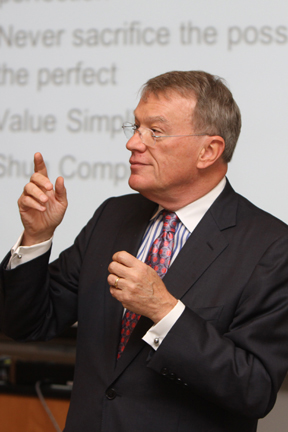Frederick Whitmer ’69 demonstrated for the Wabash community his style as a litigation attorney with the New York office of Kilpatrick Townsend & Stockton during a lecture focusing on how his liberal arts education prepared him for life as a courtroom warrior.
The author of Litigation is War, Mr. Whitmer gave a rousing, thorough, and entertaining talk to pre-law students, faculty, staff, and administrators Wednesday, the day after he served as a judge in Wabash’s 18th Annual Moot Court competition. He said the reason he is an effective trial attorney is because of “the liberal arts education I received, which opens the mind and causes you to make inquiries and ask questions… Asking the right questions is important.”
In his book, he describes in great detail the similarities of battlefield strategy with litigation strategy. In his talk to the pre-law students, he linked the broad experiences of the liberal arts and said, “The liberal arts battlefield is about playing fair to gain an advantage.”
Mr. Whitmer, a Terre Haute native, was a history major and German minor elected to Phi Beta Kappa during his time at Wabash. He was president of the Tau Kappa Epsilon fraternity and a member of the Glee Club. He earned his law degree from Columbia University where he received a Harlan Fiske Stone Scholarship. His practice focuses on patent, trademark, and intellectual property cases.
“The whole concept of being in the courtroom, which is like being here at Wabash, is the strategic manipulation of perception… That doesn’t mean you fudge the facts. But you try to manipulate the facts so that you can get people to agree with you.
“To do that, there must be a genuineness about your character.”
He talked extensively about integrity, credibility, and believability as the foundational traits of a good trial attorney. He said he never looks down on his opponent and instead “treats them like world-class citizens.” He also pointed out several times that successful attorneys keep things simple, are flexible, and communicate effectively with people on a level they understand, which he again linked to liberal arts principles.
“What I learned here — and not at Columbia — was the ability to think on my feet and the ability to react,” he said. “Listening carefully is critical. It’s not about reading a list of questions; it’s about listening to the answers and reacting accordingly.”
Throughout his boot camp-style presentation on effective litigation strategy, he told entertaining stories about his most memorable courtroom battles and involved students as players in the scenes. He told the crowd about one of the great surprises he had in court when one of his star witnesses, “a rabbi straight out of central casting,” turned out not to be a rabbi, a Ph.D., or a psychologist. “Expect uncertainty,” he said, “but surprises are only for birthdays… You never want to be surprised in the courtroom.”
Mr. Whitmer concluded his talk by describing in great detail the characteristics of what he called “litigation genius,” which he said was the “ability to pull together your experience, intelligence, and intuition.”
 Other qualities of litigation genius include:
Other qualities of litigation genius include:
• Boldness — “You’ve got to take risks, but boldness is prudence; it is not foolhardiness. Boldness exploits the adversary’s weakness as long as it’s within the rules of the game.”
• Intelligence — “Intelligence really means strength of mind and the gift of keeping calm even under the greatest stress.”
• Imagination — “Perhaps the greatest thing the liberal arts gives you is creativity.”
• Self Control — “Self control is the governor of your imagination. Only by controlling yourself can you control your adversary.”
• Determination — “Determination to succeed frees you from being a prisoner of your fears.”
• Courage — “Trust your intuitions, but also be willing to admit your mistakes.”
• Emotional Commitment to the Client — “Advocacy without commitment is counterfeit.”
• Honesty — “You must be honest in court, with your client, and most importantly to yourself.”
• Ethics — “Ethics are more important than any matter, any client, or any case. Because when the case is done, you still have to be able to look yourself in the mirror.”
• Commitment to Winning — “Make decisions to win; don’t make decisions to justify losing… If you can’t persuade your client, how are you going to persuade the court?”
Mr. Whitmer’s visit was sponsored by the Alumni and Parent Relations Office and the Pre-Law Society.